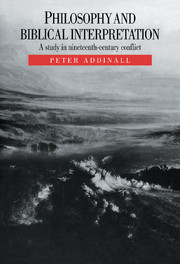Book contents
- Frontmatter
- Contents
- Preface
- Introduction
- 1 The general picture
- 2 David Hume
- 3 William Paley
- 4 Biblical conservatism
- 5 Conservative natural theology: Paley's design argument
- 6 Conservative natural theology: Thomas Chalmers
- 7 Liberal natural theology
- 8 The later nineteenth century
- 9 Immanuel Kant
- 10 Critical philosophy and the Bible
- Conclusion
- Notes
- Bibliography
- Index
- Frontmatter
- Contents
- Preface
- Introduction
- 1 The general picture
- 2 David Hume
- 3 William Paley
- 4 Biblical conservatism
- 5 Conservative natural theology: Paley's design argument
- 6 Conservative natural theology: Thomas Chalmers
- 7 Liberal natural theology
- 8 The later nineteenth century
- 9 Immanuel Kant
- 10 Critical philosophy and the Bible
- Conclusion
- Notes
- Bibliography
- Index
Summary
David Hume, the eighteenth-century Scottish philosopher, published in 1739–40 his Treatise of Human Nature. Hume's main interest was in morals, politics and the passions and inclinations which move human beings; but as a preliminary to the study of human nature in its moral and political aspects he carried out a critique of reason. His aim was to show that self-conscious human reasoning does not have the significance in human thinking and experience which it is generally assumed to have, and that its contribution to knowledge is and must be much more limited than has often been supposed. The most famous illustration of this contention given by Hume concerns the causal connection, axiomatic alike for common sense and natural science.
It is important to recognise that Hume did not deny the necessity whereby one event or set of circumstances gives rise to another, or that an event or thing is the effect of some antecedent cause. What he denied was that reason can give any explanation or justification for our acceptance of necessary causal connection. We accept it, indeed assume it because we are so constituted as to have no choice in the matter. Belief in necessary causal connection is alike unavoidable and inexplicable.
Hume by temperament had a strong antipathy to the dogmatic religious outlook and the intolerance and zeal or enthusiasm that went with it. He was subjected to frequent criticism by both Presbyterians and Anglicans, and was branded as an infidel before the General Assembly of the Church of Scotland. His application in 1744 for the Chair of Ethics and Pneumatic Philosophy at Edinburgh University was rejected because of suspicion about his moral and religious views.
- Type
- Chapter
- Information
- Philosophy and Biblical InterpretationA Study in Nineteenth-Century Conflict, pp. 22 - 34Publisher: Cambridge University PressPrint publication year: 1991



